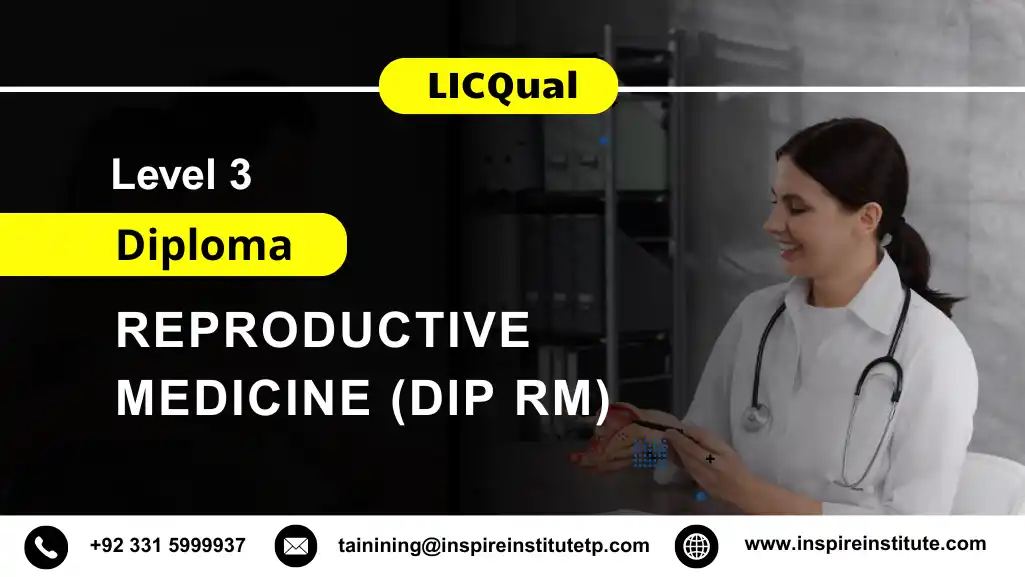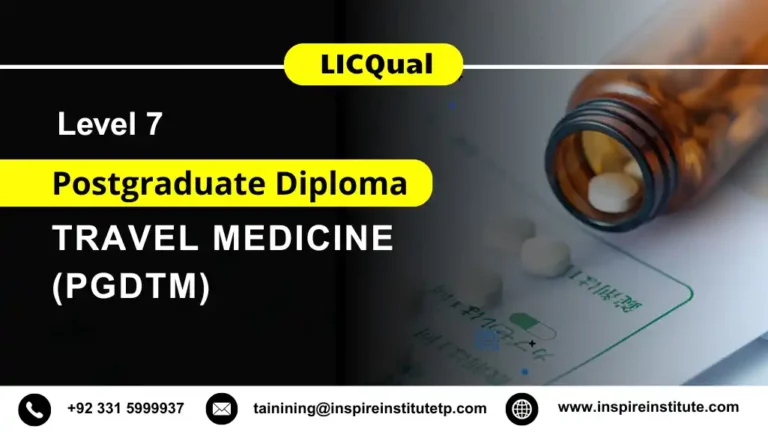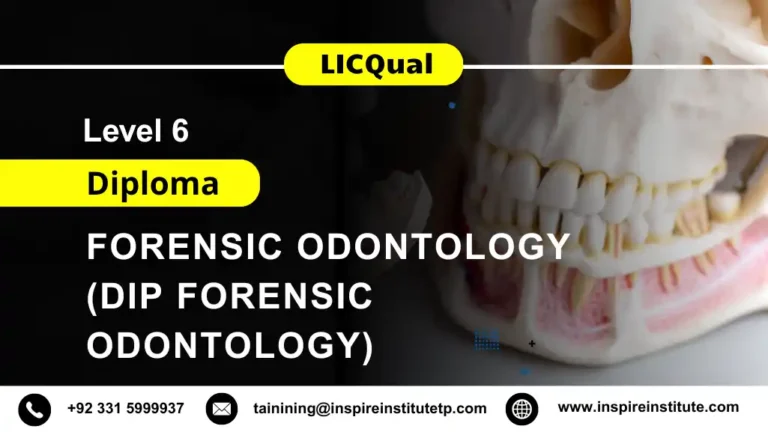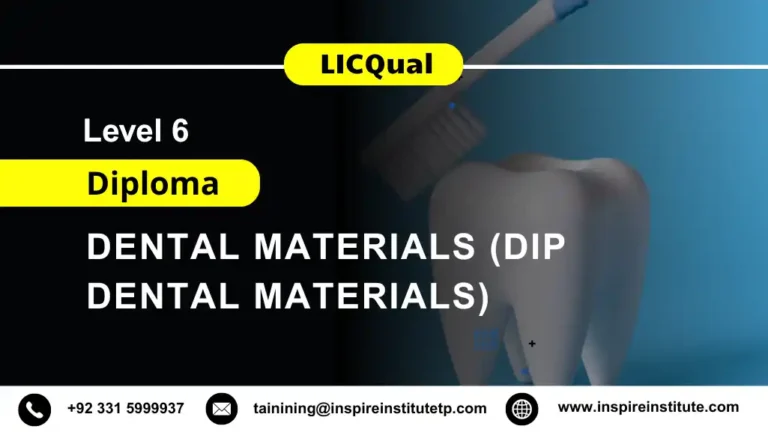LICQual Level 3 Diploma in Reproductive Medicine (Dip RM)
The LICQual Level 3 Diploma in Reproductive Medicine (Dip RM) offers a comprehensive pathway for learners seeking to develop in-depth knowledge and practical skills in this critical healthcare sector. This course is highly relevant for healthcare professionals, medical students, and laboratory technicians aiming to enhance their expertise in fertility treatments, reproductive technologies, and patient care. By completing this diploma, learners position themselves at the forefront of reproductive healthcare advancements.
Designed to cover the essential principles and practices of reproductive medicine, this course provides a structured framework that blends theoretical knowledge with practical applications. Participants will explore key topics such as human reproductive physiology, assisted reproductive technologies (ART), fertility assessment techniques, and ethical considerations in reproductive care. The Diploma in Reproductive Medicine equips learners with a strong foundation to understand both the scientific and clinical aspects of reproductive health, ensuring competence in diverse professional settings.
A core focus of the course is to develop practical skills critical to reproductive healthcare. Learners will gain hands-on experience in laboratory techniques, fertility monitoring, and patient management. By engaging with case studies, simulations, and evidence-based practices, participants enhance their ability to make informed clinical decisions. The LICQual Dip RM emphasizes practical applications that can be directly transferred to workplace settings, including fertility clinics, hospitals, and research laboratories, ensuring that learners are job-ready upon completion.
In addition to technical skills, this diploma cultivates a deep understanding of reproductive ethics, patient communication, and healthcare regulations. Students learn how to navigate sensitive situations, counsel patients effectively, and adhere to professional standards in reproductive medicine. The course also highlights emerging technologies and innovations in fertility treatments, allowing learners to remain current in a rapidly evolving field. By integrating ethical knowledge with scientific expertise, the diploma fosters well-rounded reproductive health professionals.
The LICQual Level 3 Diploma in Reproductive Medicine is suitable for both beginners and those with prior healthcare experience. Its flexible learning structure supports self-paced study while ensuring that learners achieve comprehensive mastery of the subject. Graduates of this program gain recognized credentials that enhance career opportunities in fertility clinics, hospitals, research institutions, and related healthcare environments. The course also serves as a stepping stone for advanced qualifications in reproductive medicine and allied health disciplines.
Enrolling in this diploma empowers learners to make a meaningful impact in reproductive healthcare. By combining theoretical knowledge, practical skills, and professional ethics, the LICQual Dip RM equips students with the expertise to contribute to improved patient outcomes and advancements in fertility treatments. With high-demand skills and recognized certification, graduates can confidently pursue careers in reproductive medicine, laboratory management, and clinical support, positioning themselves as valued professionals in this essential healthcare sector.
Why Choose this Qualification
The LICQual Level 3 Diploma in Reproductive Medicine (Dip RM) is a specialized qualification designed to build essential knowledge and skills for those aspiring to work in reproductive healthcare. Reproductive medicine is a critical field of study focusing on fertility, reproductive health, and assisted reproductive technologies (ART). Choosing this diploma not only strengthens your academic and professional foundation but also prepares you for a meaningful career where you can positively impact individuals and families through advanced reproductive care.
Key Reasons to Choose this Qualification
Comprehensive Understanding of Reproductive Medicine
Gain an in-depth foundation in human reproductive anatomy, physiology, and reproductive health.
Learn about the diagnosis, treatment, and management of infertility and common reproductive disorders.
Study assisted reproductive technologies (ART), including IVF and fertility preservation techniques.
Understand hormonal regulation, reproductive cycles, and ethical considerations in reproductive care.
Develop knowledge of preventive healthcare strategies, reproductive planning, and patient counseling.
Practical Skills for Real-World Healthcare
Acquire hands-on knowledge to assess reproductive health and fertility effectively.
Learn essential laboratory techniques, monitoring methods, and fertility assessments.
Apply evidence-based practices in managing acute and chronic reproductive health conditions.
Develop problem-solving abilities through clinical case studies and simulations.
Enhance confidence in delivering safe, accurate, and patient-centered reproductive care.
Career-Ready Qualification
Enhance employability with recognized reproductive healthcare skills.
Prepare for entry-level roles in fertility clinics, hospitals, and reproductive research centers.
Build a strong foundation for progressing into advanced medical, nursing, or ART studies.
Demonstrate professional competence through an internationally accredited qualification.
Strong Focus on Patient-Centered Reproductive Care
Develop communication skills for effectively supporting patients and families.
Learn to apply empathy, ethical practices, and confidentiality in reproductive healthcare.
Understand cultural and social factors affecting reproductive health management.
Gain confidence in guiding patients through fertility treatments, counseling, and preventive care.
Internationally Recognized Qualification
Earn a diploma awarded by LICQual, known for high academic and professional standards.
Open opportunities for global healthcare careers in reproductive medicine and ART.
Gain credibility and recognition among employers, peers, and professional bodies.
Use this qualification as a stepping stone for advanced reproductive healthcare certifications worldwide.
Flexible and Structured Learning
Benefit from a structured curriculum designed for progressive learning.
Learn at your own pace with assignment-based assessments that test practical and theoretical knowledge.
Access study materials and resources tailored specifically to reproductive medicine.
Balance study with professional or personal commitments without compromising learning quality.
Ethical and Professional Development
Gain insights into professional codes of conduct in reproductive healthcare.
Understand patient rights, confidentiality, and ethical guidelines in fertility treatment.
Learn to make responsible decisions in complex clinical scenarios.
Develop leadership and clinical decision-making skills for future career growth.
Contribution to Society and Reproductive Health
Play a direct role in improving reproductive health outcomes in communities.
Support initiatives to enhance fertility awareness, maternal health, and reproductive rights.
Build a career with both personal satisfaction and professional impact.
Contribute to reducing infertility challenges through skilled practice and evidence-based interventions.
The LICQual Level 3 Diploma in Reproductive Medicine (Dip RM) is more than an academic qualification; it is a pathway to a rewarding career in reproductive healthcare. With its blend of theoretical knowledge, practical skills, ethical training, and global recognition, this diploma equips learners to make a significant impact in the field of reproductive medicine. By choosing this qualification, you are investing in your professional growth while contributing meaningfully to the well-being of individuals and families.owth but also in the future health and well-being of children worldwide.
Course Overview
LICQual UK Awarding Body
Average Completion Time:
4-12 Months
Study Units: 6 Units
Evidence & Assignment Based
Mandatory Units
Who Should Take This Course
The LICQual Level 3 Diploma in Reproductive Medicine (Dip RM) is a specialized qualification designed for individuals who are passionate about reproductive healthcare and aspire to build a strong foundation in reproductive medicine. Reproductive medicine is a vital field, addressing fertility, reproductive health, and assisted reproductive technologies (ART). This diploma equips learners with the knowledge, skills, and practical expertise needed to enter healthcare professions, support patients effectively, or progress to higher-level medical studies, making it a suitable choice for a broad range of learners.
This Course is Suitable For
Aspiring Reproductive Healthcare Professionals
Build a solid understanding of human reproductive anatomy, physiology, and fertility.
Learn to identify and manage common reproductive disorders and infertility issues.
Develop skills to assess, monitor, and support patients in reproductive health settings.
Gain confidence in applying reproductive medicine principles in clinics and laboratory environments.
Nursing and Healthcare Assistants
Enhance knowledge in patient-centered reproductive care and fertility support.
Improve practical skills in monitoring reproductive health indicators and assisting ART procedures.
Strengthen communication techniques for counseling patients and families.
Acquire internationally recognized skills to advance within healthcare careers.
Medical Students and Early Career Practitioners
Use this diploma as a foundation for further studies in reproductive medicine, obstetrics, or general medicine.
Gain early exposure to reproductive health practices, ethics, and professional standards.
Develop the ability to apply evidence-based medicine in reproductive healthcare.
Enhance problem-solving and clinical decision-making skills in fertility and reproductive scenarios.
Allied Health Professionals
Strengthen reproductive medicine knowledge to support multidisciplinary healthcare teams.
Learn preventive approaches, fertility planning, and patient education strategies.
Improve patient care delivery through applied reproductive medicine principles.
Gain skills that add value to existing healthcare qualifications and professional roles.
Community Health Workers and Caregivers
Acquire essential skills to support reproductive health within community and local settings.
Learn to recognize early signs of reproductive health issues and infertility challenges.
Develop preventive healthcare practices for promoting reproductive well-being.
Enhance ability to provide education and support to patients and families.
Individuals Seeking a Career Change into Healthcare
Begin a professional journey in reproductive healthcare with a recognized qualification.
Gain specialized knowledge in reproductive medicine without requiring prior medical experience.
Acquire transferable skills applicable to clinics, hospitals, and NGOs.
Build confidence to progress into advanced healthcare education and fertility-focused studies.
International Learners Aiming for Global Healthcare Careers
Earn a globally recognized diploma that enhances employability worldwide.
Gain knowledge and skills aligned with international reproductive healthcare standards.
Strengthen professional profiles for roles in fertility clinics, hospitals, and community health centers abroad.
Open pathways for higher education and advanced reproductive medicine studies globally.
Volunteers and NGO Workers in Reproductive Health Programs
Develop expertise to contribute effectively to reproductive health and fertility initiatives.
Learn essential principles of reproductive medicine relevant to outreach programs and fieldwork.
Improve the ability to provide support services in maternal and reproductive health projects.
Gain confidence in making a positive impact on community reproductive health outcomes.
The LICQual Level 3 Diploma in Reproductive Medicine (Dip RM) is ideal for anyone committed to advancing reproductive health and supporting patients in achieving positive fertility outcomes. Whether you are an aspiring healthcare professional, a current practitioner, or someone looking to transition into the medical field, this qualification provides the foundation, practical skills, and international recognition needed to excel in reproductive medicine. By choosing this course, learners position themselves for both professional growth and meaningful contributions in reproductive healthcare. career advancement and the opportunity to make a meaningful contribution to the future of children’s healthcare.
Course Benefits
The LICQual Level 3 Diploma in Reproductive Medicine (Dip RM) provides significant benefits for individuals seeking to build expertise in reproductive healthcare, fertility management, and assisted reproductive technologies (ART). By combining essential theoretical knowledge with practical applications, this diploma equips learners to deliver high-quality reproductive care, support patients with fertility challenges, and implement preventive reproductive health strategies. Designed as a flexible, assignment-based programme, it ensures professional development while maintaining academic excellence and relevance in today’s healthcare sector.
Key Benefits of the Course:
- Specialist Knowledge: Gain a solid foundation in human reproductive anatomy, physiology, and fertility. Learners explore reproductive health, hormonal regulation, ART procedures such as IVF, management of common reproductive disorders, and preventive healthcare approaches. The course also covers ethical and patient-centered practices, preparing learners to make informed and evidence-based decisions in reproductive medicine.
- Practical Application: Develop practical skills in assessing reproductive health, conducting fertility evaluations, and supporting early diagnosis of reproductive conditions. Learners gain competence in laboratory techniques, monitoring treatment progress, and applying best practices in fertility clinics, hospitals, and community healthcare settings. The programme ensures graduates can apply theory directly to real-world reproductive healthcare.
- Recognised Qualification: Earn a UK-accredited diploma that validates advanced knowledge in reproductive medicine and strengthens professional credibility. This recognition ensures alignment with international reproductive healthcare standards, making the qualification valuable for careers in fertility clinics, hospitals, research institutions, and healthcare organizations worldwide.
- Flexible Learning Pathway: Benefit from an assignment-based study model that allows learners to continue professional or personal responsibilities while advancing academically. This flexible approach makes the LICQual Level 3 Diploma in Reproductive Medicine (Dip RM) ideal for healthcare assistants, medical students, and career changers seeking a structured yet accessible programme.
- Evidence-Based Training: Explore the latest guidelines in reproductive health, fertility treatments, and preventive medicine, ensuring learners can adopt patient-centered, safe, and effective approaches. Training emphasizes ART, fertility monitoring, hormonal assessments, and evidence-driven interventions that support both individual patients and broader community health outcomes.
- Career Development: Expand career opportunities across fertility clinics, hospitals, reproductive research centers, community health units, and international healthcare organizations. The diploma opens pathways into roles in reproductive support, fertility care, allied medical services, and further advanced studies in obstetrics, gynecology, or reproductive medicine.
- Enhanced Reproductive Healthcare Delivery: Contribute to improved fertility and reproductive health outcomes through early detection, accurate care, and preventive strategies. Learners acquire the skills to guide patients, promote wellness, and manage reproductive health challenges, ultimately improving community health and supporting family planning initiatives.
- Professional Growth: Strengthen clinical knowledge, decision-making, and communication skills needed to interact effectively with patients and families. The course also builds professional values such as empathy, ethics, and interdisciplinary collaboration, preparing learners to play a crucial role in reproductive healthcare delivery.
The LICQual Level 3 Diploma in Reproductive Medicine (Dip RM) equips learners with vital knowledge, practical competence, and a UK-recognised qualification. It empowers healthcare professionals and aspiring practitioners to improve reproductive health outcomes, support fertility treatments, contribute to public health initiatives, and advance their careers in the rewarding and impactful field of reproductive medicine.
Eligibility Criteria
The LICQual Level 3 Diploma in Reproductive Medicine (Dip RM) is a UK-accredited programme designed for aspiring healthcare professionals, nurses, laboratory technicians, and community health practitioners who wish to develop a strong foundation in reproductive healthcare, fertility management, and assisted reproductive technologies (ART). This assignment-based qualification combines essential theoretical knowledge with practical applications, making it ideal for medical students, healthcare assistants, allied health professionals, and individuals looking to specialize in reproductive medicine. By meeting the entry requirements, learners ensure they are fully prepared to succeed in the programme and apply their knowledge effectively in fertility clinics, hospitals, research laboratories, and community health settings.
Educational Background:
Applicants should hold a recognised healthcare or science-related qualification such as a diploma in healthcare practice, nursing, biology, or an equivalent qualification. Candidates with Level 2 or Level 3 qualifications in healthcare, reproductive biology, clinical science, or related fields may also be considered. Equivalent international qualifications will be reviewed on a case-by-case basis to ensure they meet the suitability standards for the programme.
Professional Experience:
While previous experience in reproductive medicine, fertility support, or general healthcare is beneficial, it is not strictly mandatory. A minimum of one year of healthcare, laboratory, or clinical experience is recommended. Applicants with exposure to reproductive healthcare, clinical assistance, or laboratory work will find the course particularly valuable, though motivated individuals without direct experience are also encouraged to apply.
Age Requirement:
Learners must be at least 18 years of age at the time of enrolment, ensuring they possess the maturity, responsibility, and commitment required for training in reproductive medicine. This requirement ensures that candidates can engage with both the academic and practical aspects of the qualification effectively.
Language Proficiency:
Since the programme is delivered in English, learners should demonstrate strong reading, writing, and communication skills. A minimum IELTS score of 6.0 or an equivalent qualification is recommended for non-native English speakers. This ensures that learners can complete assignments, engage with course resources, and interact professionally in academic and healthcare contexts.
Technical Requirements:
Applicants should have access to a computer or laptop with a stable internet connection. Basic IT skills are necessary to manage online learning platforms, conduct research, and submit assignments digitally. Familiarity with using word processing tools, spreadsheets, and accessing digital study resources will support a smoother learning experience.
Required Documents:
Submission of a valid ID or passport, proof of educational qualifications, and evidence of any healthcare or laboratory-related professional experience (if applicable) is required for registration. Applicants presenting international qualifications may be asked to provide additional documentation for verification.
The Qualification Process
LICQual Level 3 Diploma in Reproductive Medicine (Dip RM) follows a structured pathway to ensure learners gain comprehensive knowledge, practical skills, and professional competence in community oral healthcare.
Step 1: Self-Assessment
Learners review the entry requirements to confirm eligibility. Candidates with a background in dentistry, oral health, or public health are encouraged to apply.
Step 2: Registration
Complete the registration process by submitting required documents such as proof of qualifications, a valid ID, and payment of enrollment fees.
Step 3: Induction
An induction session is conducted to:
- Verify learner eligibility and documentation.
- Introduce study materials, learning outcomes, and assessment procedures.
Step 4: Learning and Evidence Submission
Learners complete assignments, case studies, and practical exercises demonstrating competence in public health dentistry, community oral health assessment, preventive strategies, and program planning.
Step 5: Feedback and Revision
Assessors review submitted evidence and provide constructive feedback. Learners can revise and resubmit work to meet all required standards.
Step 6: Competence Validation
Final submissions are evaluated to confirm that learners have met all theoretical and practical learning outcomes.
Step 7: Internal Quality Assurance (IQA)
The IQA team reviews the assessment process to ensure accuracy, fairness, and compliance with international standards.
Step 8: External Verification (EQA)
External verifiers validate the authenticity and quality of learner achievements.
Step 9: Certification
Upon successful verification, learners are awarded LICQual Level 3 Diploma in Reproductive Medicine (Dip RM) , demonstrating advanced proficiency in community oral healthcare and preparing them for professional growth in dental public health, preventive dentistry, and healthcare policy.







